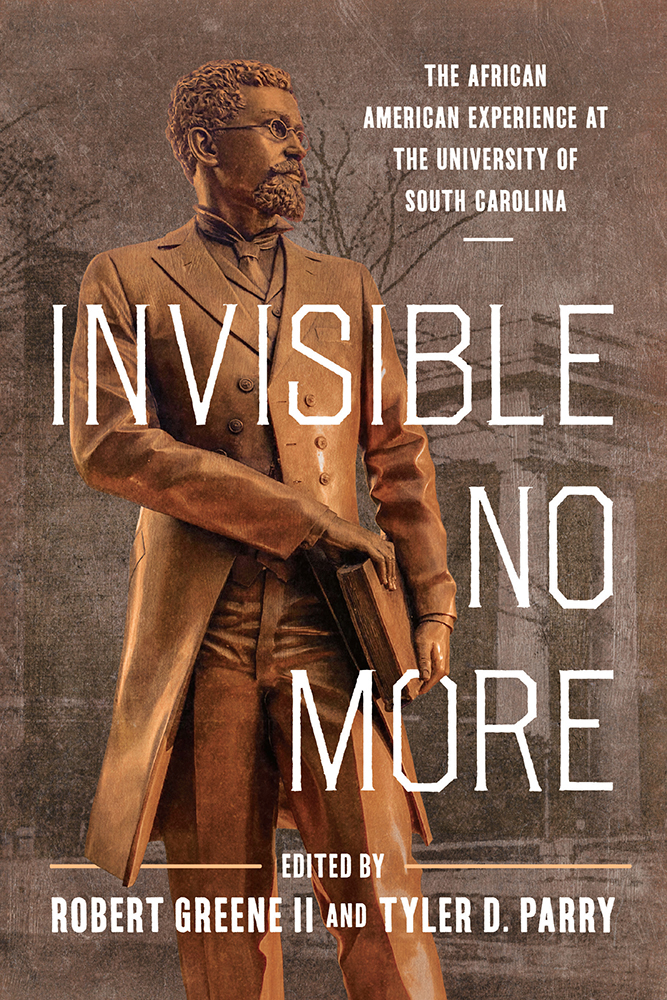Since its founding in 1801, African Americans have played an integral, if too often overlooked, role in the history of the University of South Carolina. Invisible No More seeks to recover that historical legacy and reveal the many ways that African Americans have shaped the development of the university. The essays in this volume span the full sweep of the university's history, from the era of slavery to Reconstruction, Civil Rights to Black Power and Black Lives Matter. This collection represents the most comprehensive examination of the long history and complex relationship between African Americans and the university.
Like the broader history of South Carolina, the history of African Americans at the University of South Carolina is about more than their mere existence at the institution. It is about how they molded the university into something greater than the sum of its parts. Throughout the university's history, Black students, faculty, and staff have pressured for greater equity and inclusion. At various times they did so with the support of white allies, other times in the face of massive resistance; oftentimes, there were both.
Between 1868 and 1877, the brief but extraordinary period of Reconstruction, the University of South Carolina became the only state-supported university in the former Confederacy to open its doors to students of all races. This "first desegregation," which offered a glimpse of what was possible, was dismantled and followed by nearly a century during which African American students were once again excluded from the campus. In 1963, the "second desegregation" ended that long era of exclusion but was just the beginning of a new period of activism, one that continues today. Though African Americans have become increasingly visible on campus, the goal of equity and inclusion—a greater acceptance of African American students and a true appreciation of their experiences and contributions—remains incomplete. Invisible No More represents another contribution to this long struggle.
A foreword is provided by Valinda W. Littlefield, associate professor of history and African American studies at the University of South Carolina. Henrie Monteith Treadwell, research professor of community health and preventative medicine at Morehouse School of Medicine and one of the three African American students who desegregated the university in 1963, provides an afterword.
Robert Greene II earned a PhD in history from the University of South Carolina and is assistant professor of history at Claflin University.
Tyler D. Parry is assistant professor of African American and African diaspora studies at the University of Nevada, Las Vegas. He is the author of Jumping the Broom: The Surprising Multicultural Origins of a Black Wedding Ritual.
"This groundbreaking and insightful volume is filled with rich and dynamic stories of how Black people shaped the University of South Carolina from its founding to the present. It masterfully illuminates the interconnection of race and education in the American South."—Keisha N. Blain, co-editor of #1 New York Times bestseller 400 Souls
"This thoughtful collection of essays tells an important story. Invisible No More is a significant contribution to the history of the University of South Carolina."—Walter Edgar, author of South Carolina: A History
"Invisible No More powerfully centers Black lives in shaping the University of South Carolina before 1865, to a brief Reconstruction-era integration, through the age of segregation, and into the twenty-first century. This essential volume represents an exciting contribution to a growing field rethinking how we understand universities in American society."—Kirt von Daacke, University of Virginia
"Moving chronologically from slavery to present day, Invisible No More provides an overview of African American experiences at the University of South Carolina. This thought-provoking work is a must-read for higher education professionals, in the U.S. and abroad, who are grappling with their complex histories and who wish to tell these stories."—Jody Lynn Allen, William & Mary
"[The] contributors to this book effectively argue that African American experiences are USC experiences. Invisible No More is, indeed, irresistible."—Journal of Southern History
